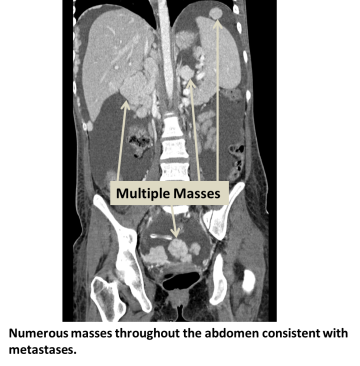Liver Metastases: Symptoms, Treatment & More
Find your care
Our experts offer a comprehensive suite of image-guided techniques to treat cancers of the liver, kidney, lung, musculoskeletal and other solid malignancies. Call 310-481-7545 to schedule a consultation or procedure.
What is metastatic liver cancer?
Metastatic liver cancer refers to cancer that originates from another organ in the body but then metastasizes, or spreads, to the liver. This is in contrast to primary liver cancer (hepatocellular carcinoma). Although spread of cancer outside of its organ of origin usually means an advanced cancer stage, there are many metastatic cancers that can be treated by oral or intravenous agents that treats the whole body via the blood stream (chemotherapy or systemic therapy).
Risk Factors

While many primary cancers can metastasize to the liver, there are ones that preferentially do so, often with no or little spread to anywhere else. Selective local control of these liver metastases therefore may result in overall control of the cancer condition for the patient, and prolong life. Classic examples of such cancers include colorectal cancer, neuroendocrine cancer, and some types of renal, breast, ovarian, and skin cancers (melanoma), amongst others.
Symptoms
Initially, there may or may not be symptoms from the metastatic liver cancer. If symptoms do occur, the symptoms for metastatic liver cancer include:
- Abdominal pain in upper-right area
- Jaundice, or yellowing of skin and eyes
- Weight loss
- Ascites
- Confusion
- Fevers
Diagnosis
When primary cancer is present, a physician may also check for metastatic liver cancer using:
- Liver function tests
- Ultrasound
- CT scan
- MRI
- PETCT
- Liver biopsy
Treatments
When liver is the only, or the dominant, site of cancer metastases from another organ, minimal invasive therapies that are directed to the liver can enhance overall cancer control while minimizing side effects to the rest of the body. Such directed therapies depends on advanced imaging expertise to determine tumor extent and to guide precise delivery of cancer killing agents to the tumor nodules and to maximize preservation of non-cancerous liver tissue. Our physicians specialize in imaging and image-guided therapies of the liver. Optimal treatment strategy can be personalized based on individual patient risk factors and detailed imaging assessment of tumor extent, and may include one or a combination of treatments below:
- Chemoembolization
- Radioembolization
- Thermal ablation (ex. Microwave and radiofrequency)
- Other forms of ablation (cryo-therapy, IRE)
- Tumor injections
- Other
For More Information:
For more information or to schedule an appointment with one of our IR physicians, please call 310-481-7545.